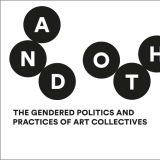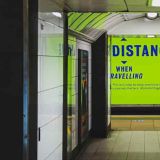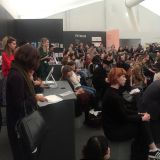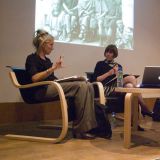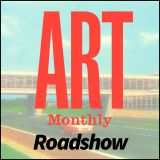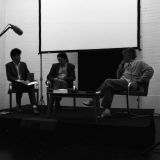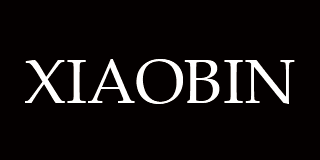Roadshow
1-Dec-22
Roadshow
And Others 4: ‘The Third Hand’ – Claire, Bernadette and Friends
In collaboration with Birmac
And Others: The Gendered Politics and Practices of Art Collectives
BIRMAC and Art Monthly, in association with Electra, present a series of four online panel conversations investigating different questions central to collective work. Building on two months of asynchronous collective writing, involving seventeen participants, the panelists below consider how we might write, think, read and practice together through other means.
Convened and moderated by Lina Dzuverovic, Birkbeck, University of London
4: ‘The Third Hand’ – Claire, Bernadette and Friends
Helena Reckitt, Chris McCormack, Gerrie van Noord
Considering the deliberate erasure of individual identities, this panel combines two interwoven lines of enquiry. Firstly, it considers a particular approach to working collectively, one in which the identities of each individual artist involved are deliberately obfuscated, forming a singular, newly created artist with their own name and a distinct, manufactured identity – what Charles Green terms the ‘third hand’.
Online event – free, but booking essential.
Permalink18-Nov-22
Roadshow
And Others 3: Is Ephemerality Freedom?
In collaboration with Birmac
And Others: The Gendered Politics and Practices of Art Collectives
BIRMAC and Art Monthly, in association with Electra, present a series of four online panel conversations investigating different questions central to collective work. Building on two months of asynchronous collective writing, involving seventeen participants, the panelists below consider how we might write, think, read and practice together through other means.
Convened and moderated by Lina Dzuverovic, Birkbeck, University of London
3: Is Ephemerality Freedom?
Ximena Alarcón-Díaz, Kuda.org/Zoran Pantelic, Irene Revell, Marina Rosenfeld
This panel questions the relationship between medium and process, taking in improvised and experimental sound practices to ask questions about different attitudes to and experiences of collective work, and whether a certain openness and enthusiasm towards collaboration, and an excitement about the process itself predominates within music and sound practice, as compared to the visual arts.
Online event – free, but booking essential.
Permalink10-Nov-22
Roadshow
And Others 2: Why collaborate? Network Formation, Reproduction, Access
In collaboration with Birmac
And Others: The Gendered Politics and Practices of Art Collectives
BIRMAC and Art Monthly, in association with Electra, present a series of four online panel conversations investigating different questions central to collective work. Building on two months of asynchronous collective writing, involving seventeen participants, the panelists below consider how we might write, think, read and practice together through other means.
Convened and moderated by Lina Dzuverovic, Birkbeck, University of London
2: Why collaborate? Network Formation, Reproduction, Access
Carla Cruz, Lily Hall, Abhijan Toto, Felicity Allen, Manual Labours
Focusing on the possible divergences between external articulations of collectivity and their internal working realities, this panel explores the formation and reproduction of networks, asking how cultural organisations engage with collective work, exploring the blurry lines and unstable positions between organisational (curatorial, communication, production, administrative) and artistic work, and the gaps between naming and acting.
Online event – free, but booking essential.
Permalink31-Oct-22
Roadshow
And Others 1: Labour, Value and Social Reproduction
In collaboration with Birmac
And Others: The Gendered Politics and Practices of Art Collectives
BIRMAC and Art Monthly, in association with Electra, present a series of four online panel conversations investigating different questions central to collective work. Building on two months of asynchronous collective writing, involving seventeen participants, the panelists below consider how we might write, think, read and practice together through other means.
Convened and moderated by Lina Dzuverovic, Birkbeck, University of London
1: Labour, Value and Social Reproduction
Fabiola Fiocco, Katja Praznik, Karolina Majewska-Güde, Kirsten Lloyd, Jelena Vesić
This panel focuses on labour and value in collective work, acknowledging that even in most progressive artists’ groups, collectives, or communities, collectivity rests on some form of socially reproductive, affective and often unremunerated labour – most often performed by female-identifying collective members, friends, partners, mothers, administrators or curators.
Online event – free, but booking essential.
Permalink6-May-21
Roadshow
Art Criticism and the Pandemic II: Wearing Out
In collaboration with the Paul Mellon Centre
Panel discussion devised by Chris McCormack for Art Monthly and the Paul Mellon Centre for Studies in British Art.
Leigh Claire Le Berge (Associate Professor of English, City University of New York)
Marc Aziz Michael (American University, Beirut)
Dante Micheaux (Poet)
Monica Narula and Jeebesh Bagchi (Raqs Media Collective)
Oreet Ashery (Associate Professor of Fine Art, Ruskin School of Art, University of Oxford)
Jackson Davidow (Independent Researcher)
Under the violent normalisation of austerity, the pandemic has exacerbated conditions of increased work surveillance and precarity, deepening an awareness of the consequences of chronic exhaustion. The now commonplace discussion of contemporary fatigue, anxiety, and depression points us, as Lauren Berlant states, ‘to the way living also becomes a scene of the wearing out of life’. From caregivers to lives more at risk of infection through socioeconomic consequences of structural racism and underpayment, how might kinships ‘wear out’ together and apart, how might artworks play a part in redefining the public sphere or enable us to consider the interrelations of equity and collective care.
Art Criticism and the Pandemic II continues and reshapes the discussions had at two events in 2020 which considered how the structures of a globalised art world had been interrupted or changed and whether, in the context of renewed activism, the art world is addressing problems of inequity and injustice in its own order. These ideas remain urgent as the art world negotiates the legacies and ramifications of making, thinking, and writing about art in the context of a global pandemic. Two live research lunch events across two days will provide spaces for testing out ideas voiced by a panel of speakers, followed by discussion and questions from attendees.
Zoom webinar
Permalink5-May-21
Roadshow
Art Criticism and the Pandemic II: Safer Spaces
In collaboration with the Paul Mellon Centre
Panel discussion devised by Chris McCormack for Art Monthly and the Paul Mellon Centre for Studies in British Art.
Stella Nyanzi (Scholar and Human Rights Activist)
Sria Chatterjee (Contributing Editor, British Art Studies)
Ariane Sutthavong (Independent Curator)
Isobel Harbison (Lecturer, Goldsmiths, University of London)
How might the tension between individual body control and collective health security during this current ‘disruption’ of the pandemic be constructed through a timeline of conflicting modernities and vaccination? Further, considering the global as one continually remade by colonial forces and extraction, how might histories of pandemics chart our understanding of the way state-craft narratives have made visible the infected, the sick or dangerous body through border control. How might these broader forces be manifested at a cultural and art institutional level, and how might art confront these forces of ‘progression’ or continue to trade in these values?
Art Criticism and the Pandemic II continues and reshapes the discussions had at two events in 2020 which considered how the structures of a globalised art world had been interrupted or changed and whether, in the context of renewed activism, the art world is addressing problems of inequity and injustice in its own order. These ideas remain urgent as the art world negotiates the legacies and ramifications of making, thinking, and writing about art in the context of a global pandemic. Two live research lunch events across two days will provide spaces for testing out ideas voiced by a panel of speakers, followed by discussion and questions from attendees.
Zoom webinar
Permalink10-Jul-20
Roadshow
Art Criticism and the Pandemic: Whose Body?
In collaboration with the Paul Mellon Centre
Larne Abse Gogarty
Robert McRuer
Jade Montserrat
Neo Sinoxolo Musangi
Marina Vishmidt
We are witness to how structural inequity has exacerbated the effects of the pandemic including for people in poverty, for keyworkers, for women and for people of colour. Using the frame of the art world, this event queries whose body is cared for and whose is ignored? It will turn to the current visibility of long-term racial injustices and the momentum of the Black Lives Matter movement. It will ask how art practice and writing can foster care and healing, renewal and health in light of the pandemic.
Permalink9-Jul-20
Roadshow
Art Criticism and the Pandemic: Resetting the Global
In collaboration with the Paul Mellon Centre
Khairani Barokka
David Dibosa
Juliet Jacques
Barbara Rodriguez Munoz
Rehana Zaman
Several months into a devastating pandemic, the globalised art world has been grounded and changed. Exhibition models and curatorial pursuits including the Blockbuster, the Biennale and the art fair, are left in limbo. Are the restricted conditions of movement for many in the western world fostering alternative forms of practice, display and exchange? This event aims to glimpse possibilities for renewal beyond existing globalised systems. Speakers will address a wide-ranging set of issues and raise questions of ecological imperative, use of technology and the new status of art, for consideration and discussion.
Permalink16-Oct-15
Roadshow
The End(s) of Post-Internet Art
Richard Grayson, Morgan Quaintance & Maria Walsh chaired by Chris McCormack
Walsh returns to her feature ‘I Object’ to consider how artists such as Mark Leckey, Hito Steyerl and Ed Atkins are keen to dissolve their subjectivity in order to exist in a non-hierarchical network of things. Quaintance questions whether post-internet is an aesthetic that relinquishes criticality for a compliance with corporate and right-wing thinking, while Grayson asks what are the ‘ends of post-internet art’, analysing why the trend has become so popular.
Read the articles online:
I Object Maria Walsh on art and the new objecthood
Right Shift Morgan Quaintance on the end of post-internet art
Talkin’ ’bout their g-g-g-generation Richard Grayson on the ends of post-internet art
25-Sep-10
Roadshow
For and Against the Interview
Chaired by Sally O’Reilly at the Whitechapel Gallery
The interview: an invaluable historical tool or a perpetuation of the cult of celebrity? The first in the Whitechapel Gallery’s Banjos at Dawn series of duelling debates sees Art Monthly contributors Gilda Williams and Julian Stallabrass take up opposing positions, while Sally O’Reilly ensures etiquette is observed.
Permalink6-Oct-08
Roadshow
What is the Future of Art Education? Part 2
Chaired by Patricia Bickers at Ikon Gallery, Birmingham
What is the Future of Art Education?
In response to demand, Art Monthly organised two public debates: one in London in September and one in Birmingham in October. At these events readers were given the opportunity to question educational professionals and policy makers.
The panels debated the motion: ‘Is further privatisation, corporatisation and instrumentalism inevitable or are there alternatives?’ and responded directly to the question ‘What is the Future of Art Education?’
Panel:
Pavel Büchler, artist and research professor at Manchester Metropolitan University.
Phyllida Barlow, artist, professor of fine art and director of undergraduate studies at Slade.
Michael Corris, writer and professor of fine art at the Art & Design Research Centre, Sheffield Hallam University.
Vaughan Grylls, artist and former director of Kent Institute of Art and Design.
Permalink27-Sep-08
Roadshow
What is the Future of Art Education? Part 1
Chaired by Patricia Bickers at the ICA, London
What is the Future of Art Education?
In response to demand, Art Monthly organised two public debates: one in London in September and one in Birmingham in October. At these events readers were given the opportunity to question educational professionals and policy makers.
The panels debated the motion: ‘Is further privatisation, corporatisation and instrumentalism inevitable or are there alternatives?Æ and responded directly to the question ‘What is the Future of Art Education?’
Panel:
Michael Corris is a writer and professor of fine art at the Art & Design Research Centre, Sheffield Hallam University.
Lisa Le Feuvre is a writer, curator and lecturer on the curatorial programme at the Department of Art, Goldsmiths.
Paul Gough is chair of the art and design group of the Research Assessment Exercise and pro-vice chancellor at University of West of England in Bristol.
Irit Rogoff is an art historian and professor of visual cultures at Goldsmiths.
Paul Wood is the author of ‘Between God and the Saucepan’, a study of English art education from the 18th century to the present day, which will be published in the History of British Art in November 2008.
Permalink7-Nov-07
Roadshow
Fair’s Fair: Why do we love to hate art fairs?
Chaired by David Barrett at the ICA, London
Love them or loathe them Art Fairs are here to stay. Part of the art market, art fairs don’t just benefit dealers and collectors but artists too, so why do so many art critics despise them? Isn’t it time to move the debate along from the default position of ‘museum shows good: art fairs bad?’
Panel: Pryle Berhman, Lisa Le Feuvre, Peter Suchin
Permalink27-Oct-07
Roadshow
Seth Siegelaub & Pavel Büchler
Chaired by Ian Hunt at Spike Island, Bristol
The two artists in conversation.
Permalink10-Aug-07
Roadshow
Art, Music, Performance
Chaired by Sally O’Reilly at Collective Gallery, Edinburgh
David Ryan and Kirsten Norrie are both artists and both musicians, Sally O’Reilly is a critic and curator of performance events and all three write for Art Monthly. They discussed the crossovers between music, performance and other art forms and tried to address some of problems of definition that arise as a result. They tackled the common questions about interdisciplinarity such as how do you critique or react to a work which combines more than one art form? How context affects the work – when music is played within an art context and vice versa? What difference can the audience make if the work is ‘participatory’, ‘interactive’, or ‘transactive’?
Permalink15-Jul-07
Roadshow
Institutionalisation for All
Chaired by Patricia Bickers at Cornerhouse, Manchester
Worlds within Worlds: The Institutions of Art
‘If institutionalisation once lurked ominously in the distance for the avant-garde radical, today it is instantaneous, ubiquitous and unexceptional.’ – Dave Beech
Are today’s artists powerless to resist institutionalisation?
The Art Monthly panel will attempt to define the concepts of ‘institutionalisation’ in art and ‘the institutions of art’ and debate the changing practice of institutional critique, including the phenomenon of self-institutionalisation which, arguably, has superseded it.
Permalink30-Nov-05
Roadshow
The Camera Never Lies?
Craig Burnett, Alison Green, Axel Lapp & Julian Stallabrass at Camden Art Centre, London
The Camera Never Lies?
Despite the crimes committed in the name of photographic truth are photographs themselves innocent? With Art Monthly critics Craig Burnett, Alison Green, Axel Lapp and Julian Stallabrass.
Permalink8-Oct-05
Roadshow
Art’s Debunkers: The Judgement
At the Whitechapel Gallery, London
The Good, the Bad and the Ugly: Judging the Value of Art
How is art judged in the present anti-aesthetic, yet post-theoretical times? Who judges the value of art – the collector, the dealer, the curator or the critic? Art Monthly critics Dave Beech, JJ Charlesworth, Jonathan Harris and Sarah James met to debate the relationship between criticism and the art market and what this means for the formation of critical judgements about art.
Permalink1-Feb-03
Roadshow
Crisis What Crisis? Are we facing a crisis in art Criticism?
Chaired by Alex Coles at Tate Britain, London
The State of Art Criticism
Following a seminar convened by Alex Coles and held at Tate Britian on the theme of the state of Art Criticism a series of features were published in Art Monthly. Michael Archer’s riposte to Coles’s ‘The Bathroom Critic’ provoked other writers and critics to reply, their responses in the form of features, letters and polemics continued to be printed in Art Monthly across five issues.
Permalink
